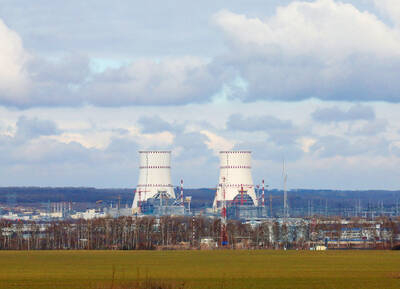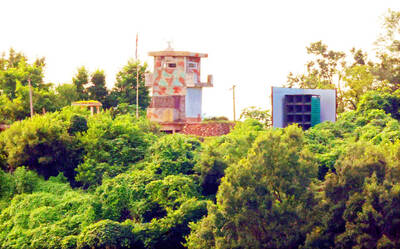France and Italy on Thursday reported new victims of a heatwave that has engulfed Europe for the last two weeks, bringing the number of deaths to more than 80 people, as storms also took their toll.
High temperatures persisted in northern Italy, Germany and southeast Europe, but forecasters predicted that spreading storms and rain would bring respite to many areas of the baking continent.
Rain would come as welcome relief to farmers, who in many countries have reported withering crops, and would also help boost perilously low water levels.
The French health-monitoring authority InVS updated the death toll in France to 64, from a previous estimate of 40, and the heat was also blamed for a further three deaths in the north of Italy.
This year, there has been no repetition of the massive loss of life caused by the last major heatwave in 2003 when in France alone 15,000 people died.
Factors such as greater awareness, slightly lower temperatures and preventative action by governments to protect the elderly are thought to have helped limit the number of deaths.
The director of the French InVS health monitoring body, Gilles Brucker, warned that the number of deaths could rise in France, even though wet weather lowered temperatures across most of France on Thursday.
Separately on Thursday, French weather office Meteo France announced that July had been the hottest month on record, on average three to four degrees above the norm.
In Italy, a victim was found dead in his apartment in Padua and two elderly people also died, one in his garden near Padua and the other in north Lombardy during a walk to cool down.
Italian Agriculture Minister Paolo de Castra called the heatwave "dramatic" in an interview with newspaper La Repubblica and authorities have estimated the damage to the country's agricultural sector at about US$637 million.
Figures showing the fall in water levels in Italy were also cause for concern.
The level of the River Po, which runs across the north of Italy, fell by 7cm on Wednesday at one measuring station.
On Wednesday, French Environment Minister Nelly Olin had warned that groundwater levels in the Paris region were at their lowest level in 20 years and said that water restrictions were in place for nearly half of the country.
"It needs to rain without storms. That would be the ideal situation but I don't think we're there yet today," she told French television channel France 2.
In Germany temperatures were back above 30oC on Thursday, after heavy storms the night before, and a motorway was closed after concrete sections cracked and lifted in the heat.
But storms were the order of the day again on Thursday with one man being killed and several others, including seven firefighters, injured by lightning.
The 19-year-old man was killed near the northwestern city of Bremen as he tried to close the window of his car.
The A5 highway near the western city of Frankfurt was set to undergo emergency repairs overnight Friday after pieces of the surface lifted 20cm to 30cm.
Temperatures in Germany were expected to reach 38oC in some parts on Thursday before cooling over the weekend when more storms were forecast.
On Wednesday night, storms above Paris led to the diversion of three Air France planes to Lille airport in the north of the country and caused 152 emergency incidents.
In Spain, where nine people have died so far from the heat, temperatures fell by two to five degrees on Thursday, where storms and rain were expected.

Philippine President Ferdinand Marcos Jr has fired his national police chief, who gained attention for leading the separate arrests of former Philippine president Rodrigo Duterte on orders of the International Criminal Court and televangelist Apollo Carreon Quiboloy, who is on the FBI’s most-wanted list for alleged child sex trafficking. Philippine Executive Secretary Lucas Bersamin did not cite a reason for the removal of General Nicolas Torre as head of the 232,000-member national police force, a position he was appointed to by Marcos in May and which he would have held until 2027. He was replaced by another senior police general, Jose

POWER CONFLICT: The US president threatened to deploy National Guards in Baltimore. US media reports said he is also planning to station troops in Chicago US President Donald Trump on Sunday threatened to deploy National Guard troops to yet another Democratic stronghold, the Maryland city of Baltimore, as he seeks to expand his crackdown on crime and immigration. The Republican’s latest online rant about an “out of control, crime-ridden” city comes as Democratic state leaders — including Maryland Governor Wes Moore — line up to berate Trump on a high-profile political stage. Trump this month deployed the National Guard to the streets of Washington, in a widely criticized show of force the president said amounts to a federal takeover of US capital policing. The Guard began carrying

Ukrainian drone attacks overnight on several Russian power and energy facilities forced capacity reduction at the Kursk Nuclear Power Plant and set a fuel export terminal in Ust-Luga on fire, Russian officials said yesterday. A drone attack on the Kursk nuclear plant, not far from the border with Ukraine, damaged an auxiliary transformer and led to 50 percent reduction in the operating capacity at unit three of the plant, the plant’s press service said. There were no injuries and a fire sparked by the attack was promptly extinguished, the plant said. Radiation levels at the site and in the surrounding

‘DELIBERATE PROVOCATION’: Pyongyang said that Seoul had used a machine gun to fire at North Korean troops who were working to permanently seal the southern border South Korea fired warning shots at North Korean soldiers that briefly crossed the heavily fortified border earlier this week, Seoul said yesterday after Pyongyang accused it of risking “uncontrollable” tensions. South Korean President Lee Jae-myung has sought warmer ties with the nuclear-armed North and vowed to build “military trust,” but Pyongyang has said it has no interest in improving relations with Seoul. Seoul’s military said several North Korean soldiers crossed the border on Tuesday while working in the heavily mined demilitarized zone (DMZ) separating the two Koreas. The incursion prompted “our military to fire warning shots,” South Korea’s Joint Chiefs of Staff